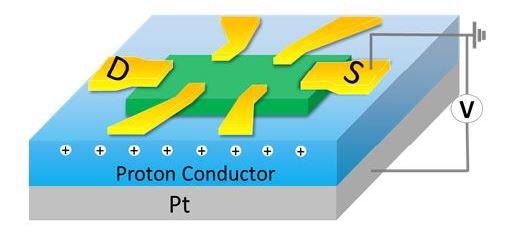Jun 16 2021
Magnetic-spin interactions that allow spin-manipulation by electrical control allow potential applications in energy-efficient spintronic devices.
 Hall-bar device on solid proton conductor, used to measure Hall resistivity under different conditions. Image Credit: FLEET
Hall-bar device on solid proton conductor, used to measure Hall resistivity under different conditions. Image Credit: FLEET
An antisymmetric exchange known as Dzyaloshinskii-Moriya interactions (DMI) is vital to form various chiral spin textures, such as skyrmions, and permits their potential application in energy-efficient spintronic devices.
Published this week, a Chinese-Australia collaboration has for the first time illustrated that DMI can be induced in a layered material tantalum-sulfide (TaS2) by intercalating iron atoms, and can further be tuned by gate-induced proton intercalation.
Realizing and Tuning DMI in Van-der-Waals Material TaS2
Searching for layered materials that harbour chiral spin textures, such as skyrmions, chiral domain Walls is vital for further low-energy nanodevices, as those chiral spin textures are building blocks for topological spintronic devices and can be driven by ultra-low current density.
Crystal structure, showing iron atoms (red) in tantalum-sulfide structure
Generally, chiral spin textures are stabilized by DMI. Therefore, introducing and controlling DMI in materials is key in searching and manipulating the chiral spin textures.
“Tantalum-sulfide is one of the large family of transition metal dichalcogenide (TMDCs) investigated by FLEET for low-energy applications,” says the study’s first author, FLEET Research Fellow Dr Guolin Zheng (RMIT).
The team firstly successfully realized a sizable DMI in the layered material tantalum-sulfide (TaS2) by intercalating Fe atoms.
However, electrically controlling the DMI turns out to be challenging:
“Both conventional electric-field gating, and the widely-used alternative technique of ion-liquid (Li+) gating have hit stumbling blocks in the electrical control of DMI in itinerant ferromagnets, because the electric-field and Li+ can only modulate the carriers close to the surface,” explains Guolin.
To address this limitation in tuning the DMI, the group at RMIT recently developed a new protonic gate technique, and successfully illustrated that DMI can be dramatically controlled by gate-induced proton intercalations.
Hall-bar device on solid proton conductor, used to measure Hall resistivity under different conditions
By increasing the intercalation of protons by gate voltage, the team were able to significantly change the carrier density and further tune the DMI via the Ruderman-Kittel-Kasuya-Yosida (RKKY) mechanism, which refers to the coupling of nuclear magnetic moments.
“The observed topological Hall resistivity after proton intercalation has been increased more than four-fold under a few volts, indicating a huge increase of DMI,” says co-author A/Prof Lan Wang (also at RMIT).
“The successful tuning of DMI in chiral magnet Fe-intercalated TaS2 by protonic gate enables an electrical control of the chiral spin textures as well as the potential applications in energy-efficient spintronic devices,” says co-author Prof Mingliang Tian, who is a FLEET Partner Investigator and Director of the Centre’s partner organisation the High Magnetic Field Laboratory (Anhui Province, China).
The Study
“Tailoring Dzyaloshinskii-Moriya interaction in a transition metal dichalcogenide by dual-intercalation” was published in Nature communications in June 2021. (DOI: 10.1038/s41467-021-23658-z)
As well as support from the Australian Research Council, support was also provided by the National Natural Science Foundation of China, the National Key R&D Program of China, the Chinese Academy of Sciences (CAS; Youth Innovation Promotion Association and 100 Talents Program) and the High Magnetic Field Laboratory (China).